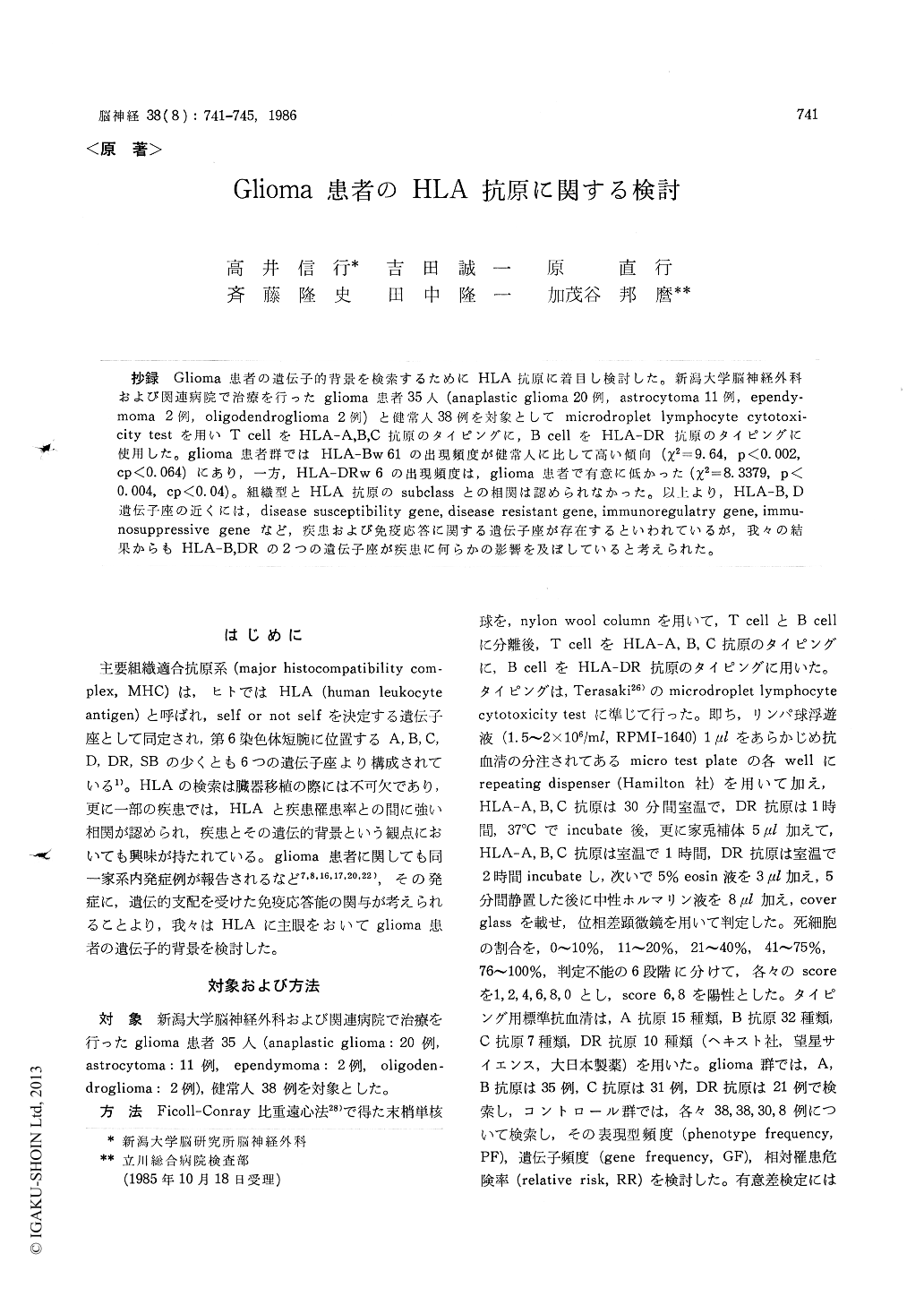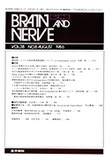Japanese
English
- 有料閲覧
- Abstract 文献概要
- 1ページ目 Look Inside
抄録 Glioma患者の遺伝子的背景を検索するためにHLA抗原に着目し検討した。新潟大学脳神経外科および関連病院で治療を行ったglioma患者35人(anaplastic glioma 20例,astrocytoma 11例,ependy-moma 2例,oligodendroglioma 2例)と健常人38例を対象としてInicrodroplet lymphocyte cytotoxi-city testを用いT cellをHLA-A,B,C抗原のタイピングに,B cellをHLA-DR抗原のタイピングに使用した。glioma患者群ではHLA-Bw 61の出現頻度が健常人に比して高い傾向(χ2=9.64, p<0.002,cp<0.064)にあり,一方,HLA-DRw 6の出現頻度は,glioma患者で有意に低かった(χ2=8.3379, p<0.004, cp<0.04)。組織型とHLA抗原のsubclassとの相関は認められなかった。以上より,HLA-B,D遺伝子座の近くには,disease susceptibility gene, disease resistant gene, immunoregulatry gene, immu-nosuppressive geneなど,疾患および免疫応答に関する遺伝子座が存在するといわれているが,我々の結果からもHLA-B,DRの2つの遺伝子座が疾患に何らかの影響を及ぼしていると考えられた。
HLA was studied in 35 patients with gliomas (20 anaplastic gliomas, 11 astrocytomas, 2 ependy-momas, 2 oligodendrogliomas) and 38 volunteers who served as controls, by using the microdroplet lymphocyte cytotoxicity test. Phenotype frequency (PF), gene frequency (GF) and relative risk (RR) of each HLA antigen were studied statistically with the χ2-test, where corrected P (CP)<0.05 was considered significant.
Concerning HLA-B antigens, either Bw 61 or Bw 62 was found in 45.7% of the patients and the both in 14.3%. HLA-Bw 61 had a tendency to increase in the patients (PF=0.46, GF=0.27, RR=7.16, χ2=9.64, P<0.002, CP<0.064). Con-trary to HLA-B antigens, HLA-DRw 6 was ab-sent in the patient (χ2=8.3379, P<0.004, CP<0.04). No relation between HLA and histological types was found.
HLA has its genetic locus on the short bra-chium of the 6th chromosome and complement C2, C4, properdin, etc are considered to link HLA. Immunoregulatory genes (Ir genes), immunosup-pressive genes (Is genes), disease susceptibility genes and disease resistant genes are also consi-dered to link HLA, especially HLA-B, D loci. Although diseases are multifactorial, according to our report, the incidence of HLA-Bw 61 is higher, while that of HLA-DRw 6 is lower in patients with glioma. These phenomena seem very interest-ing considering the previous evidence that HLA has a close relation between disease susceptibility and immunological competence.
HLA is only a genetic marker of diseases, but if any relations between HLA and diseases can be found, it may be very useful for the diagnosis and prognostic evaluation to identify the HLA of patients. Further investigation is necessary.

Copyright © 1986, Igaku-Shoin Ltd. All rights reserved.


